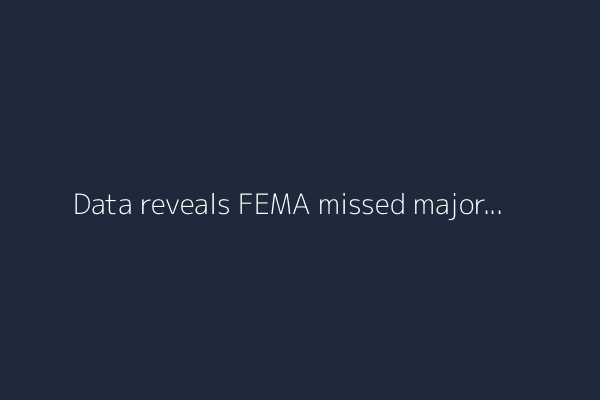See what’s trending right now
Trump Immigrationin U.S News
2 hours agoA judge has blocked Trump's order restricting birthright citizenship following a Supreme Court ruling, signaling a legal setback for the policy.
U.S News
Data reveals FEMA missed major flood risks. And, measles hit highest level in decades
negativeU.S News
A new report shows that FEMA underestimated flood risks at Camp Mystic in Texas—a tragic oversight, given that more than two dozen people died there in recent floods. Meanwhile, measles cases in the U.S. have surged to their highest level in over 30 years, raising alarms about public health preparedness.
Editor’s Note: These two stories highlight systemic failures—one in disaster planning, the other in disease prevention. The FEMA data suggests gaps in how flood risks are assessed, with deadly consequences. The measles spike, likely tied to declining vaccination rates, shows how quickly preventable diseases can rebound. Together, they’re a wake-up call about the cost of underestimating risks—whether from nature or public health.
New data reveals FEMA missed major flood risks at Camp Mystic
negativeU.S News
Fresh data shows FEMA seriously underestimated flood dangers at Camp Mystic and surrounding areas along Texas' Guadalupe River. Shockingly, the real number of people living in flood zones here is over double what government maps predicted—meaning thousands more homes and lives are at risk than officials realized.
Editor’s Note: When flood maps are wrong, it’s not just paperwork—it puts real people in harm’s way. This isn’t just about bureaucratic oversights; families and businesses might’ve skipped flood insurance or built in dangerous spots because they trusted outdated info. With extreme weather getting worse, accurate maps are literally life-or-death.
Former commissioner of flooded Texas county says siren system would have saved lives
negativeU.S News
A former Kerr County commissioner, Tom Moser, is speaking out about a missed opportunity to prevent tragedy—he pushed for a siren warning system years ago, arguing it could have saved lives during recent floods. His comments highlight a frustrating "what if" scenario for communities hit hard by extreme weather.
Editor’s Note: This isn’t just about hindsight—it’s a stark reminder that infrastructure choices (or lack thereof) have real consequences. When officials ignore warnings or delay action, people pay the price. Stories like this put pressure on leaders to take preventive measures seriously before the next crisis hits.
Why World Pulse Now?
Global Coverage
All major sources, one page
Emotional Lens
Feel the mood behind headlines
Trending Topics
Know what’s trending, globally
Read Less, Know More
Get summaries. Save time
Stay informed, save time
Learn moreLive Stats
Articles Processed
9,237
Trending Topics
118
Sources Monitored
211
Last Updated
an hour ago
Live data processing
How it works1-Minute Daily Briefing
Stay sharp in 60 seconds. Get concise summaries of today’s biggest stories — markets, tech, sports, and more
Why World Pulse Now?
Global Coverage
All major sources, one page
Emotional Lens
Feel the mood behind headlines
Trending Topics
Know what’s trending, globally
Read Less, Know More
Get summaries. Save time
Stay informed, save time
Learn moreLive Stats
Articles Processed
9,237
Trending Topics
118
Sources Monitored
211
Last Updated
an hour ago
Live data processing
How it works1-Minute Daily Briefing
Stay sharp in 60 seconds. Get concise summaries of today’s biggest stories — markets, tech, sports, and more


